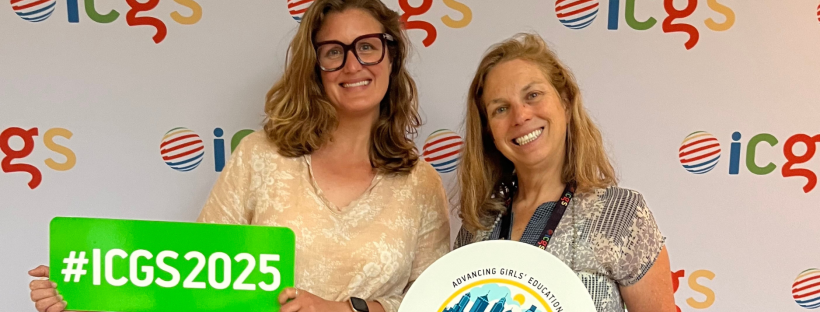What I’m Taking Back to My Classroom After Attending the 2025 ICGS Conference

Philadelphia might be known as the Mural Capital of the World, but if you search for public monuments dedicated to women, you might be disappointed. By some estimates, of the over 1,000 public monuments and statues in the city that’s the birthplace of the American Constitution, only four depict real women.
I learned this unacceptable, yet perhaps not shocking fact for those familiar with women’s history and America’s fraught relationship with historical memory, at the opening session of this year’s International Coalition of Girls’ Schools (ICGS) conference. The 2025 conference was hosted in the city of “sisterly love,” as attendees affectionately renamed it. This was my second time attending it, and I’m taking away a number of insights as I prepare to welcome students into my classroom and deepen connections with colleagues. They are: community is critical, and girls’ education is inherently feminist and optimistic.
Community Is Critical
In the midst of late-night grading, early-morning commutes, and blurry-eyed afternoon faculty meetings, it’s easy to forget why we entered the world of girls’ education. The good news is that we are not tasked with doing this work in isolation. Communities like ICGS offer much-needed spaces for educators at girls’ schools to recharge, vent, laugh, learn new skills, and feel the magic of a diverse group of people who collectively believe in the transformative power of all-girls’ education.
That this community is called a coalition is no mistake, and the opportunities for personal and professional growth at an ICGS conference are endless. I’m excited to bring back to my classroom the insights and new curricular content I learned from Marcos Rosales and Georgina Emerson of The Spence School, who led a workshop on the “Artist as Historian.” From them, I learned about Thomas McEvilley’s essay “Thirteen Ways of Looking at a Blackbird,” which I plan to incorporate into a unit on the Harlem Renaissance in my U.S. History course to help students learn how to read a piece of artwork. Likewise, their discussion of Janet Sobel, the Ukrainian artist who influenced Jackson Pollock, inspired me to explore with my students the many other Janet Sobels who fall outside America’s incomplete canons of art and history.
Girls’ Education Is Inherently Feminist
While the historical contexts that precipitated the formation of all-girls’ schools have shifted, one need only glance at our current political and social realities to know that such conditions have yet to fully disappear. Cheryl Giovannoni, Chief Executive at Girls’ Day School Trust (GDST), reminded us about this in her ICGS talk, “Progress for Women Means Progress For All–Breaking Down Barriers, Building Allies and Raising Voices through Education.” Giovannoni offered a powerful rebuttal to the current “gender wars” narrative, arguing that women’s equality and education benefits the whole society.
Likewise, Georgina Emerson and Rachel Flores of The Spence School reinforced my conviction that teaching girls and young women to be confident thinkers and compassionate leaders is itself a feminist act. In their inspiring talk, “Intentional Feminism: The Hidden Potential of Girls’ Schools,” we explored their question: How can we operationalize feminist values in our school communities?
Whether or not we teach in schools that actively use the word “feminism,” our shared belief in the importance of compassionate and inclusive leadership, the intersection of relational and skill-based teaching, and the power of non-hierarchical ways of being in the world remain crucial.
Girls’ Education Offers Optimism
The energy, excitement, and joy at this year’s ICGS gathering was palpable. Nonetheless, the heaviness of the global context in which we were meeting was equally felt. The assault on reproductive rights, threats to academic freedoms, eroding democratic norms, and attempts to narrowly define who counts as a “worthy” citizen are stark realities that we must take seriously. My time with other members of the ICGS community restored my confidence that we are indeed a feisty and unflinching bunch with no interest in retreating into the past. While apathy, cynicism, and even despair might be understandable responses to the current state of our world, to teach at a girls’ school is to continually reject hopelessness and choose the messy work of building a world that is inclusive, creative, and radically ethical.
Perhaps most importantly, ICGS pushes its members to continually expand our thinking and assumptions. If Philadelphia’s woeful representation of women in public monuments is any indicator, all-girls’ education remains powerful, urgent, and necessary. It is an honor and privilege to be a part of a coalition of educators who are unapologetically committed to inspiring the next generation of women leaders, thinkers, builders, and creators, honoring our histories and paving a hopeful path forward.

Carly Fox is a History and Social Sciences faculty member at Castilleja School, an independent girls’ school in Palo Alto, California. She graduated from Cal Poly with a BS in Social Sciences and from Sarah Lawrence College with an MA in Women’s History. She previously taught US History at Vermont Academy, where she also helped establish the school’s first Diversity and Inclusion program and served as a yoga instructor and assistant ski coach for students. Ms. Fox is passionate about progressive teaching styles and women’s education.